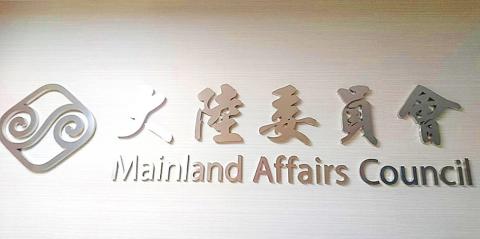Hong Kong’s ban on wearing masks at protests is expected to increase confrontations between protesters and authorities, the Mainland Affairs Council (MAC) said on Friday.
In a statement, the council urged the Hong Kong government to adopt measures based on respect for human rights and freedom, saying that the ban on masks at protests would only stir up greater conflict and further complicate the situation.
The council’s response came after Hong Kong Chief Executive Carrie Lam (林鄭月娥) announced the ban earlier on Friday, citing a provision in the territory’s colonial-era law authorizing rules to be issued when there is “a state of serious danger.”

Photo: Chung Li-hua, Taipei Times
Since June, Hong Kong has seen massive demonstrations on the streets, with protesters insisting on demands that include universal suffrage, instead of a system in which the territory’s chief executive is selected from a pool of candidates pre-screened by Chinese authorities.
The ban on masks at protests, an apparent attempt to quell the chaos, took effect at 12:01am yesterday and protesters who contravene it could face up to one year in prison and a fine of up to HK$25,000 (US$3,189).
The Taiwanese government understands the fears of Hong Kongers, as the ban is expected to undermine their safety, hurt their freedom of speech and violate their human rights, the council said.
The ban is likely to tarnish Hong Kong’s international image and diminish its status as a global financial hub, the council added, urging the Hong Kong government to preserve core human rights and freedoms by meeting the public’s demands and resolving the current crisis.
The Presidential Office is paying close attention to the situation in Hong Kong and hopes the territory’s government will hold a sincere dialogue with Hong Kongers to restore calm, Presidential Office spokesman Alex Huang (黃重諺) said.
The ban represents a setback in democracy, Democratic Progressive Party Chairman Cho Jung-tai (卓榮泰) said, calling on the Hong Kong government to restrain itself.
A Chinese Nationalist Party (KMT) statement released yesterday quoted KMT Chairman Wu Den-yih (吳敦義) as saying that the timing of the ban is inappropriate, as it would destabilize the situation.
The KMT does not hope to see demonstrations get out of hand and affect Hong Kong’s stability and development, but rather hopes that the Hong Kong government can improve communication with the public, sympathize with people’s concerns and understand their demands, the statement said.
Wu was quoted as urging the Hong Kong government and Chinese authorities to face Hong Kongers’ demands and return to rational communications.
The campaign office of Kaohsiung Mayor and KMT presidential candidate Han Kuo-yu (韓國瑜) said that the ban is unlikely to solve the problems that the Hong Kong government faces, calling on both police and Hong Kongers to act rationally.
Taipei Mayor Ko Wen-je (柯文哲) yesterday said that the ban only “cures the symptoms, not the disease.”
The ban would only intensify the conflict between the Hong Kong government and the demonstrators, leading to a more difficult situation, he said.
“The Hong Kong government and the Beijing government have to honestly face the problems and ‘prescribe the proper treatment’ to settle the crisis,” Ko said. “The problem is not whether the people wear masks, but rather that the government shouldn’t cover up its eyes.”
Additional reporting by Lee I-chia and Shih Hsiao-guang

Taipei has once again made it to the top 100 in Oxford Economics’ Global Cities Index 2025 report, moving up five places from last year to 60. The annual index, which was published last month, evaluated 1,000 of the most populated metropolises based on five indices — economics, human capital, quality of life, environment and governance. New York maintained its top spot this year, placing first in the economics index thanks to the strength of its vibrant financial industry and economic stability. Taipei ranked 263rd in economics, 44th in human capital, 15th in quality of life, 284th for environment and 75th in governance,

The Sports Administration yesterday demanded an apology from the national table tennis association for barring 17-year-old Yeh Yi-tian (葉伊恬) from competing in the upcoming World Table Tennis (WTT) United States Smash tournament in Las Vegas this July. The sports agency said in a statement that the Chinese Taipei Table Tennis Association (CTTTA) must explain to the public why it withdrew Yeh from the WTT tournament in Las Vegas. The sports agency said it contacted the association to express its disapproval of the decision-making process after receiving a complaint from Yeh’s coach, Chuang

Control Yuan Secretary-General Lee Chun-yi (李俊俋) tendered his resignation last night, admitting that he had misused a government vehicle, as reported by media. His resignation was immediately accepted by the Control Yuan. In a statement explaining why he had resigned, Lee apologized for using a Control Yuan vehicle to transport his dog to a pet grooming salon on May 20. The issue first came to light late last month, when TVBS News reported that Lee had instructed his driver to take the dog to the salon. The news channel broadcast photos that it said were taken by an unnamed whistle-blower, which purportedly showed the

A former officer in China’s People’s Liberation Army (PLA) who witnessed the aftermath of the 1989 Tiananmen Square massacre has warned that Taiwan could face a similar fate if China attempts to unify the country by force. Li Xiaoming (李曉明), who was deployed to Beijing as a junior officer during the crackdown, said Taiwanese people should study the massacre carefully, because it offers a glimpse of what Beijing is willing to do to suppress dissent. “What happened in Tiananmen Square could happen in Taiwan too,” Li told CNA in a May 22 interview, ahead of the massacre’s 36th anniversary. “If Taiwanese students or